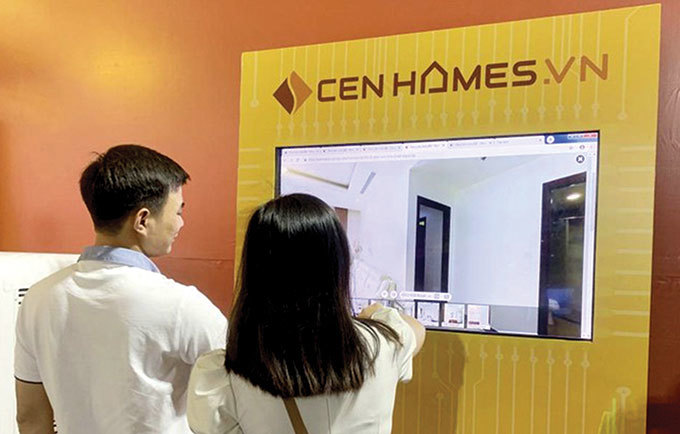 |
In mid-May, CenLand held a ceremony to launch its CenHomes real estate technology platform, which helps international customers and investors verify information to guarantee safe and transparent market transactions.
Guests at the ceremony were impressed by the multi-dimensional experience space created by a large LED screen system, an intelligent interactive screen system, and 3D scanning technology. Many got there early just to be among the first to experience this new real estate technology.
At cenhomes.vn, CenHomes plays the role of information “filter” for both buyers and sellers in the real estate market, providing information on legal issues, construction status, and real prices in every project.
Projects uploading on to cenhomes.vn are subject to strict measurement, supervision, and appraisal by the CenHomes team.
The ceremony allowed guests to explore the preeminent features of the new technology. Technology is seeping into every aspect of people’s lives and transforming the way they live and do business, including in real estate.
Technologies designed for real estate are known as proptech (property technology), and many analysts in Vietnam believe it is creating positive breakthroughs in information for the market, changing the way people buy, sell, finance, and manage property.
Different offerings
Vietnam’s real estate market has welcomed many other proptech platforms besides CenHomes. Cho Tot Nha, a property platform developed by Cho Tot, for example, helps users buy and sell property directly from others and make the appropriate transactions, which take place offline.
It actively applies technology to control the quality of postings and create a convenient and personalized experience for users.
Cho Tot Nha does not break the traditional real estate model but only adds to the market a new form of real estate proptech application, which helps buyers and sellers save on cost and time compared to traditional methods.
Its user numbers on the buying side increased 20 per cent year-on-year in the first quarter, with successful sales rising 14 per cent.
Mr. Nguyen Trong Tan, Deputy General Director of Cho Tot, told VET that the application of technology has seen it record impressive figures in terms of listing quality and successful sales.
“Proptech is a global trend, creating a positive change in the real estate market in many countries,” he said. “The proptech wave has been well received in Vietnam, with many new technologies enhancing the experience and promoting transparency.”
Proptech startups have also entered the market. Founded in 2016, Rever defines itself as a brokerage company connecting technology with brokers and a pioneer in using 3D technology to introduce housing to customers.
It completed nearly 300 transactions in the first quarter, after growing more than four-fold in 2018 compared to 2017, earning revenue of more than $1.6 million.
Co-founder Phan Nhat Minh believes the application of technology in real estate brokerage will help with the search process and information comparisons, make real estate transactions faster and more transparent for buyers, and help sellers have a clearer picture of valuations, while allowing brokers to increase their performance and service quality.
“Technology helps the brokers that have joined us, while customers trust us by depositing property, which helps us generate greater revenue,” he said.
Established in late 2015, Homedy is a property portal that had reached more than 8 million page views by the first quarter of this year, with 1.8 million visitors.
Business performance in 2018 increased three-fold compared to 2017.
Mobile apps are a growing trend that provide convenient for users, with Homedy developing advanced features.
Mr. Nguyen Ba Duc, Founder and CEO of Homedy, told VET that applying NLP (Natural Language Processing) helps analyze keywords and process and return the correct results for users, resulting in daily search volumes increasing.
Meanwhile, its Recommendation System offers suggestions for other properties based on those viewers have looked at previously, increasing connection rates between buyers and sellers.
Foreign investors are also eyeing proptech in Vietnam. Asian property technology group the PropertyGuru Group and Vietnamese property portal Batdongsan.com.vn announced in late 2018 that the latter is now a fully consolidated member of the former, cementing their long-standing relationship. Homedy.com also announced recently it successfully raised new investment capital from three large funds: Genesis Ventures, Access Ventures, and Mynavi Corporation.
“With the explosion of e-commerce changing the shopping habits of users, searches for real estate on online floors are increasing,” said Mr. Duc. “Proptech is clearly popular in Vietnam’s real estate market.”
New technology to develop
 |
Investing in technology has become essential in the digital age, and competition in the market is becoming fiercer as proptech receives greater investment, Mr. Duc believes.
“The battle for online real estate in Vietnam is not only among proptech providers but also traditional brokers,” he said. Mr. Tan, meanwhile, believes that within the next three years, the development of large data technology, artificial intelligence (AI), blockchain, and virtual reality (VR) technology will drastically change the real estate industry in Vietnam and the world.
To adapt to market requirements, proptech companies are constantly improving their technology. CenHomes has integrated key technologies in Industry 4.0 such as AI and big data to help with information use, record market trends, and provide 24/7 support to customers.
One prominent feature of the website is its VR technology, producing lively 3D images of projects and the local neighborhood as well as real estate information for international customers and investors.
Meanwhile, Cho Tot Nha has applied AI technology to identify and signal invalid postings, help shorten the time to approve information, and improve the quality of postings.
Big data is thoroughly applied on the buyer side, anticipating their behavior and helping them quickly find the right properties.
“Cho Tot Nha will continue to invest in AI and Machine Learning technologies to continuously improve products and turn the difficult and time-consuming job of buying a home into a convenient new experience,” said Mr. Tan.
Similarly, Homedy focuses on investment in AI and Machine Learning, improving search algorithms and valuations, and building a Recommendation System.
It is also studying NLU (Natural-Language Understanding) to build a chatbot to ensure the timely delivery of information to users. Homedy is currently preparing to release the second version of its mobile app, with a nice interface, easy use, and outstanding features.
It will also continue to upgrade available features and study certain new features, such as demographics (to help users see how popular areas are) and the optimization and continuous updating of price reference features, and continue to research and develop the “Chat with a broker” feature, to increase interaction between buyers and sellers.
Rever has invested in many brokerage technologies. Brokers it works with can create marketing data for less than three seconds in its system. It provides a set of real estate price estimates by using data analysis combined with actual transaction data.
Many analysts have said that Industry 4.0 is a means for proptech companies to create their own strengths, while users are also increasingly inclined to experience new technologies.
Figures from Cho Tot Nha show that in 2018, on average, a buyer needed to see only 14 listings on proptech platforms before making contact regarding a suitable property.
Instead of taking more time and effort to review each location, online real estate buying and selling sites help users find information more conveniently at home.
“The existence and development of a proptech startup depends on technological innovation and strategy,” said Mr. Duc.
“Companies that apply different types of technologies and strategies can provide different results.”
Investing in technology has become essential in the digital age, and competition in the market is becoming fiercer as proptech receives greater investment.
Within the next three years, the development of large data technology, artificial intelligence (AI), blockchain, and virtual reality (VR) technology will drastically change the real estate industry in Vietnam and the world. VN Economic Times
Ngoc Lan

Eco-urban areas to lead real estate market in near future
Ecological urban areas will help satisfy the needs for green living for new generations of residents.

Construction Ministry’s statistics on real estate inventories incorrect: HoREA
The Ministry of Construction's statistics on the total real estate inventory value is incorrect as the inventories of many property enterprises are not fully taken into account, according to the HCMC Real Estate Association (HoREA).
 Proptech is playing an increasingly important role in information provision and the buying and selling of properties." itemprop="description" />
Proptech is playing an increasingly important role in information provision and the buying and selling of properties." itemprop="description" />